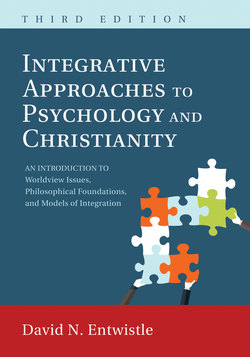Описание книги
Professor David Entwistle's Integrative Approaches to Psychology and Christianity is now available in a fully revised 3rd edition. Changes and additions have made throughout this unique volume, including: * 42 additional pages * expanded list of models discussed * more questions for discussions, and * an updated bibliography.
As disciplines, psychology and theology share an overlapping interest in the nature and functioning of human beings. This book provides an introduction to many of the worldview issues and philosophical foundations that frame the relationship of psychology and theology, includes scholarly reflection on the integration literature, and surveys five paradigms of possible relationships between psychology and Christianity. The book is designed to help readers become aware of the presuppositional backdrops that each of us brings to these issues, and to understand various approaches for relating psychology and Christianity as partly based on presuppositional assumptions. Questions at the end of each chapter are included to help readers evaluate both the material and their own burgeoning approach to integration. This book is ideal as a textbook for students of psychology and other behavioral and social sciences (social work, sociology, theology, counseling, pastoral counseling) at both the graduate and undergraduate level. It is also written for the broader readership of psychologists, counselors, pastors, and others who are interested in integration.
As disciplines, psychology and theology share an overlapping interest in the nature and functioning of human beings. This book provides an introduction to many of the worldview issues and philosophical foundations that frame the relationship of psychology and theology, includes scholarly reflection on the integration literature, and surveys five paradigms of possible relationships between psychology and Christianity. The book is designed to help readers become aware of the presuppositional backdrops that each of us brings to these issues, and to understand various approaches for relating psychology and Christianity as partly based on presuppositional assumptions. Questions at the end of each chapter are included to help readers evaluate both the material and their own burgeoning approach to integration. This book is ideal as a textbook for students of psychology and other behavioral and social sciences (social work, sociology, theology, counseling, pastoral counseling) at both the graduate and undergraduate level. It is also written for the broader readership of psychologists, counselors, pastors, and others who are interested in integration.
